研究室紹介Laboratories
- Back
- Top > 研究室紹介 > がん先端診断・治療開発学(連携) > 先端がん診断学(愛知県がんセンター)
がん先端診断・治療開発学(連携)先端がん診断学(愛知県がんセンター)
概要
先端がん診断学では、ヒトやマウスの血液や腫瘍組織、がん細胞株など、様々な生体材料を用いて、プロテオミクスを中心とした統合的オミクス解析を行い、新規バイオマーカーや治療標的の探索同定、さらにその臨床応用まで、多岐にわたる幅広い研究を展開しています。関連病院との密接な連携と共同研究を通して、臨床上解決すべき重要な問題点や疑問に基礎医学的なアプローチを用いて取り組む、また基礎研究から得られた成果を臨床に還元するという、双方向性の橋渡し(トランスレーショナル)研究を強力に推進しているのが私たちの特長です。基礎から臨床まで、様々なバックグラウンドを持つ研究者が、消化器がん、肺がんを中心に、がんの克服という大きな目標に向かって、一丸となって突き進んでいます。
研究プロジェクト
先端がん診断学では、ヒトやマウスの血液や腫瘍組織、がん細胞株など、様々な生体材料を用いて、プロテオミクスを始めとしたマルチオミクス解析を行い、消化器がんと肺がんを中心に、がんの新しい診断法や治療法の開発と、その臨床応用を強く意識した研究を展開しています(図1)。
図1:マルチオミクス解析によるがん診断・治療法開発への取り組み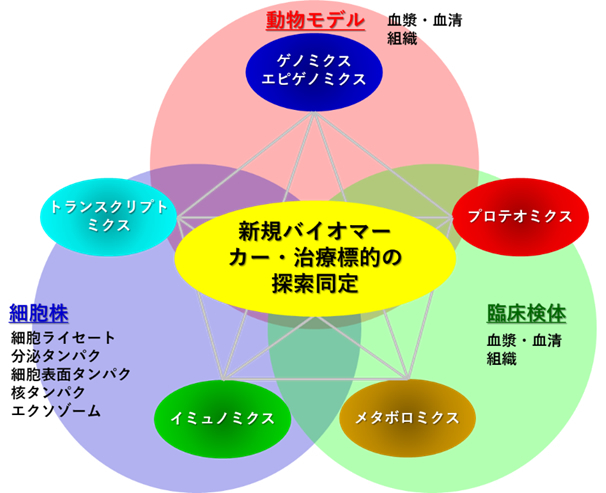
(1) がんの早期診断・個別化医療を目指した血液バイオマーカーの探索
血液バイオマーカーは、簡便かつ低侵襲、低コストで高スループットな診断法となりえることから、癌の早期診断や個別化医療において、大きな期待が寄せられています。
遺伝子改変がんマウスモデルの血中タンパクプロファイルの詳細な解析から、肺がんマウスモデルにおいて、血中タンパクシグネチャが肺がんの分子生物学的特徴を反映すること、さらにその肺がん関連血中シグネチャタンパクが、肺がんと診断される1年前に採取された血液中でも、健常者に比べて肺がん患者で上昇していることを明らかにし、血液バイオマーカーの肺がん早期診断における有用性を世界に先駆けて示してきました(Taguchi et al. Cancer Cell 2011)。この研究が基となって開発された血液診断テストは、米国における現行の肺がんスクリーニングガイドライン(USPSTF)のほぼ倍となる約80%の感度で、2年以内に肺癌と診断される人を見つけることができます(Guida et al. JAMA Oncol. 2018; 図2)。このテストにより、極めて精度の高い肺がんのリスク評価が可能であり、現在FDA承認を目指した臨床試験を行っています。また、同じようにがんマウスモデルの血中タンパク解析から、膵がん、大腸がんの早期診断に有用な血中タンパクバイオマーカーについてもそれぞれ報告しています(Capello et al. JNCI 2017; Taguchi et al. Cancer Prev Res 2015)。
図2:タンパクバイオマーカーによる肺がんの早期診断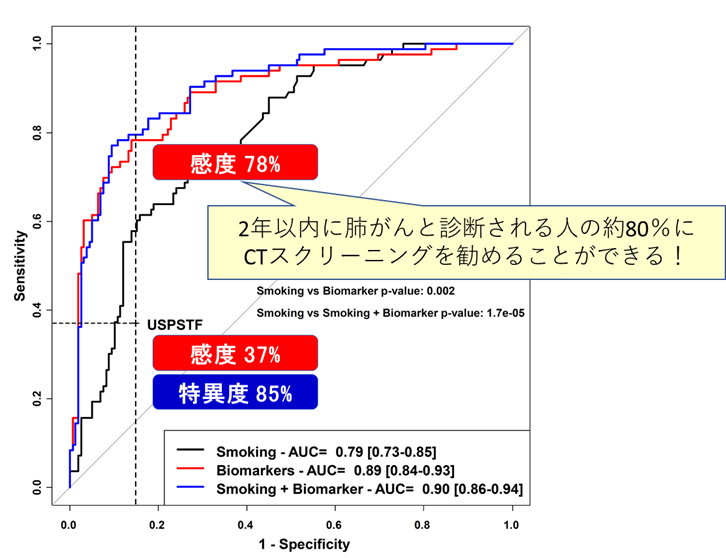
血液においては、タンパク以外にも、循環腫瘍細胞 (circulating tumor cells; CTC)、DNA、マイクロRNA、メタボライト、エクソゾーム、自己抗体などが、有望ながんバイオマーカーになりうると考えられています。当分野では、このような様々な分子を、マウスモデルや臨床検体を用いて網羅的に解析し、大腸がんや膵がんなど多岐にわたるがんを対象に、早期診断血液バイオマーカーの探索を行っています。
また、個別化医療に有用な血液バイオマーカーについても研究を進めています。最近の研究では、血中マイクロRNAプロファイルに基づく肺がんの再発予測モデルを開発しました(図3)。このほかにも、大腸がん、直腸がん、膵がん、食道がんなどで治療反応性や再発・予後を予測するための血中バイオマーカーの研究に取り組んでいます。
図3:血中マイクロRNAプロファイルに基づく肺腺がん再発予測モデル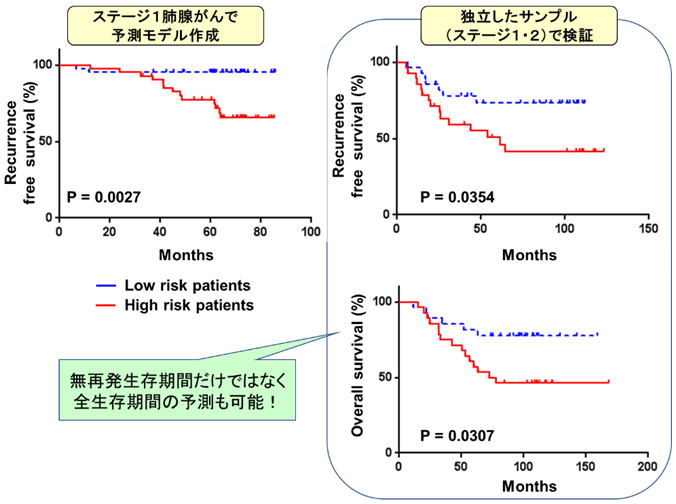
(2) 網羅的分子プロファイリングによるがんの分子病態の解明と新規治療標的分子の探索
現在までに、100を超える代表的なヒトがん細胞株(肺がん、膵がん、大腸がん、乳がん、卵巣がん)を用いて、細胞ライセート、細胞表面タンパク、分泌タンパクの各分画について、タンパクの高深度かつ網羅的プロファイリングを行っています(図4)。がん種、遺伝子突然変異に加えて、様々ながんの形質に関連するタンパクシグネチャの同定と機能的解析を行い、新規がん胎児性抗原であるVCX/Yの肺がんにおける過剰発現(Taguchi et al. Cancer Res. 2014)、p53突然変異に関連するタンパクシグネチャ(Taguchi et al. Proteomics. 2014)、イリノテカン感受性を決定するCES2の膵がんにおける過剰発現(Capello et al. JNCI. 2015)、間葉系の形質を示す肺がんの分子シグネチャ(Schliekelman et al. Cancer Res. 2015)と免疫プロテアソームの欠損(Tripathi et al. PNAS. 2016)、LKB1 不活化を持つ肺腺がんにおけるCPS1の過剰発現とその機能的重要性(Celiktas et al. JNCI. 2017)、MCAMを介した肺小細胞がんの化学療法抵抗性(Tripathi et al. Cancer Res. 2017)などを報告してきました。
現在は、このタンパクプロファイリングをさらに発展させて、細胞株だけではなくPDX腫瘍を中心とした腫瘍組織のゲノム、mRNA、タンパク、マイクロRNAなど様々な分子プロファイルの統合的解析を行っています。タンパクプロファイリングでは、特に抗体療法などの直接的な標的となりえる細胞表面タンパクや、リン酸化などタンパクの翻訳後修飾も含めた、より詳細なプロファイリングに積極的に取り組んでいます。
図4:がん細胞株の網羅的タンパクプロファイリング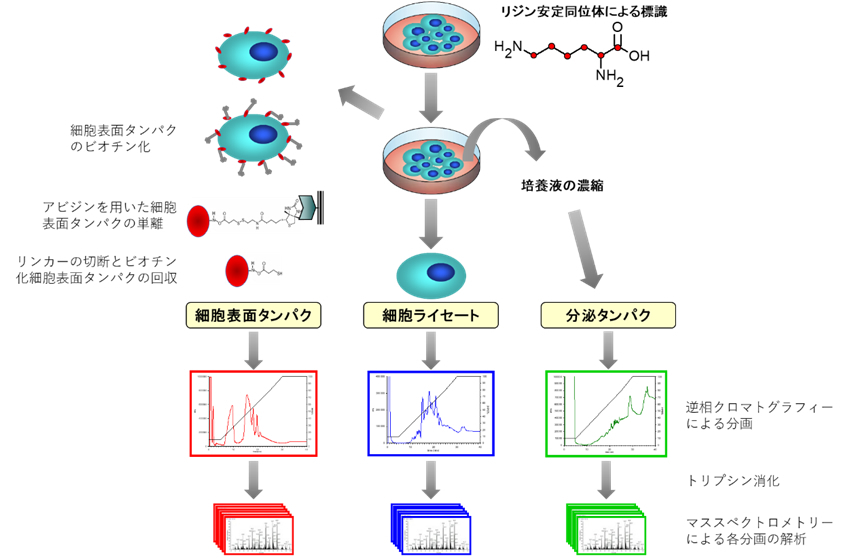
(3) ノンコーディングRNAが関わる発がん分子機構の解明
ゲノムから転写される遺伝子産物の大部分は、タンパクをコードしないノンコーディングRNAであることが知られています(図5)。近年、ノンコーディングRNAが、転写や翻訳、スプライシング、クロマチン構造制御に至るまで、様々な生物学的プロセスにおいて重要な役割を果たしており、またその発現は、厳密に制御されていることが明らかになってきました。私たちは、ノンコーディングRNAの中で、長さが20塩基前後のマイクロRNAと200塩基以上からなる長鎖ノンコーディングRNA (long non-coding RNA, lncRNA)の解析から、その制御機構の破綻とがん化との関連を明らかにし、ノンコーディングRNAをターゲットにした新たながん治療法の開発に取り組んでいます。また、このようなノンコーディングRNAの一部は、短いペプチド(マイクロペプチド)をコードしている可能性が示唆されており、当分野のタンパク解析技術を生かしてマイクロペプチドの網羅的解析にも取り組んでいます。
図5:ノンコーディングRNA研究の新展開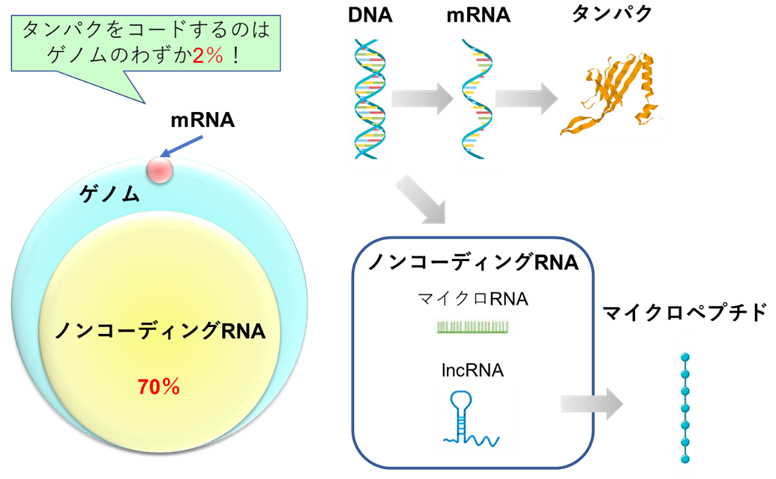
教員
| 構成員名 | 役職 | 所属 |
|---|---|---|
| 田口 歩 | 分野長 | 先端がん診断学 |
| 梶野 泰祐 | 主任研究員 | 先端がん診断学 |
| 阿部 雄一 | 主任研究員 | 先端がん診断学 |
研究実績
- 2019年
- Yao W, Rose JL, Wang W, et al. Syndecan 1 is a critical mediator of macropinocytosis in pancreatic cancer. Nature 2019;568(7752):410-414.
- Taguchi A, Arenberg D. Harnessing Immune Response to Malignant Lung Nodules. Promise and Challenges. Am J Respir Crit Care Med 2019;199(10):1184-1186.
- Fahrmann JF, Bantis LE, Capello M, et al. A Plasma-Derived Protein-Metabolite Multiplexed Panel for Early-Stage Pancreatic Cancer. J Natl Cancer Inst 2019;111(4):372-379.
- Capello M, Vykoukal JV, Katayama H, et al. Exosomes harbor B cell targets in pancreatic adenocarcinoma and exert decoy function against complement-mediated cytotoxicity. Nat Commun 2019;10(1):254.
- 2018年
- Shiels MS, Kirk GD, Drummond MB, et al. HIV Infection and Circulating Levels of Prosurfactant Protein B and Surfactant Protein D. J Infect Dis 2018;217(3):413-417.
- Integrative Analysis of Lung Cancer E, Risk Consortium for Early Detection of Lung C, Guida F, et al. Assessment of Lung Cancer Risk on the Basis of a Biomarker Panel of Circulating Proteins. JAMA Oncol 2018;4(10):e182078.
- 2017年
- Vykoukal J, Sun N, Aguilar-Bonavides C, et al. Plasma-derived extracellular vesicle proteins as a source of biomarkers for lung adenocarcinoma. Oncotarget 2017;8(56):95466-95480.
- Tripathi SC, Fahrmann JF, Celiktas M, et al. MCAM Mediates Chemoresistance in Small-Cell Lung Cancer via the PI3K/AKT/SOX2 Signaling Pathway. Cancer Res 2017;77(16):4414-4425.
- Fu R, Wang P, Ma W, et al. A statistical method for detecting differentially expressed SNVs based on next-generation RNA-seq data. Biometrics 2017;73(1):42-51.
- Dayde D, Tanaka I, Jain R, et al. Predictive and Prognostic Molecular Biomarkers for Response to Neoadjuvant Chemoradiation in Rectal Cancer. Int J Mol Sci 2017;18(3).
- Celiktas M, Tanaka I, Tripathi SC, et al. Role of CPS1 in Cell Growth, Metabolism and Prognosis in LKB1-Inactivated Lung Adenocarcinoma. J Natl Cancer Inst 2017;109(3):1-9.
- Capello M, Bantis LE, Scelo G, et al. Sequential Validation of Blood-Based Protein Biomarker Candidates for Early-Stage Pancreatic Cancer. J Natl Cancer Inst 2017;109(4).
- 2016年
- Tripathi SC, Peters HL, Taguchi A, et al. Immunoproteasome deficiency is a feature of non-small cell lung cancer with a mesenchymal phenotype and is associated with a poor outcome. Proc Natl Acad Sci U S A 2016;113(11):E1555-64.
- Sun N, Taguchi A, Hanash S. Switching Roles of TGF-beta in Cancer Development: Implications for Therapeutic Target and Biomarker Studies. J Clin Med 2016;5(12).
- Ruhaak LR, Stroble C, Dai J, et al. Serum Glycans as Risk Markers for Non-Small Cell Lung Cancer. Cancer Prev Res (Phila) 2016;9(4):317-23.
- Redis RS, Vela LE, Lu W, et al. Allele-Specific Reprogramming of Cancer Metabolism by the Long Non-coding RNA CCAT2. Mol Cell 2016;61(4):520-534.
- Hanash S, Taguchi A, Wang H, et al. Deciphering the complexity of the cancer proteome for diagnostic applications. Expert Rev Mol Diagn 2016;16(4):399-405.
- 2015年
- Wikoff WR, Hanash S, DeFelice B, et al. Diacetylspermine Is a Novel Prediagnostic Serum Biomarker for Non-Small-Cell Lung Cancer and Has Additive Performance With Pro-Surfactant Protein B. J Clin Oncol 2015;33(33):3880-6.
- Taguchi A, Rho JH, Yan Q, et al. MAPRE1 as a plasma biomarker for early-stage colorectal cancer and adenomas. Cancer Prev Res (Phila) 2015;8(11):1112-9.
- Schliekelman MJ, Taguchi A, Zhu J, et al. Molecular portraits of epithelial, mesenchymal, and hybrid States in lung adenocarcinoma and their relevance to survival. Cancer Res 2015;75(9):1789-800.
- Miyamoto S, Taylor SL, Barupal DK, et al. Systemic Metabolomic Changes in Blood Samples of Lung Cancer Patients Identified by Gas Chromatography Time-of-Flight Mass Spectrometry. Metabolites 2015;5(2):192-210.
- Capello M, Lee M, Wang H, et al. Carboxylesterase 2 as a Determinant of Response to Irinotecan and Neoadjuvant FOLFIRINOX Therapy in Pancreatic Ductal Adenocarcinoma. J Natl Cancer Inst 2015;107(8).
- 2014年
- Taguchi A, Taylor AD, Rodriguez J, et al. A search for novel cancer/testis antigens in lung cancer identifies VCX/Y genes, expanding the repertoire of potential immunotherapeutic targets. Cancer Res 2014;74(17):4694-705.
- Taguchi A, Delgado O, Celiktas M, et al. Proteomic signatures associated with p53 mutational status in lung adenocarcinoma. Proteomics 2014;14(23-24):2750-9.
- Hanash SM, Taguchi A. Mouse to human blood-based cancer biomarker discovery strategies. Cold Spring Harb Protoc 2014;2014(2):144-9.
- 2013年
- Tam KW, Zhang W, Soh J, et al. CDKN2A/p16 inactivation mechanisms and their relationship to smoke exposure and molecular features in non-small-cell lung cancer. J Thorac Oncol 2013;8(11):1378-88.
- Taguchi A, Hanash SM. Unleashing the power of proteomics to develop blood-based cancer markers. Clin Chem 2013;59(1):119-26.
- Taguchi A, Hanash S, Rundle A, et al. Circulating pro-surfactant protein B as a risk biomarker for lung cancer. Cancer Epidemiol Biomarkers Prev 2013;22(10):1756-61.
- Sin DD, Tammemagi CM, Lam S, et al. Pro-surfactant protein B as a biomarker for lung cancer prediction. J Clin Oncol 2013;31(36):4536-43.
- Ruhaak LR, Nguyen UT, Stroble C, et al. Enrichment strategies in glycomics-based lung cancer biomarker development. Proteomics Clin Appl 2013;7(9-10):664-76.
- 2012年
- Hanash S, Schliekelman M, Zhang Q, et al. Integration of proteomics into systems biology of cancer. Wiley Interdiscip Rev Syst Biol Med 2012;4(4):327-37.
- 2011年
- Zhang Q, Taguchi A, Schliekelman M, et al. Comprehensive proteomic profiling of aldehyde dehydrogenases in lung adenocarcinoma cell lines. Int J Proteomics 2011;2011:145010.
- Wang H, Wong CH, Chin A, et al. Integrated mass spectrometry-based analysis of plasma glycoproteins and their glycan modifications. Nat Protoc 2011;6(3):253-69.
- Taguchi A, Politi K, Pitteri SJ, et al. Lung cancer signatures in plasma based on proteome profiling of mouse tumor models. Cancer Cell 2011;20(3):289-99.
- Nishikawa E, Osada H, Okazaki Y, et al. miR-375 is activated by ASH1 and inhibits YAP1 in a lineage-dependent manner in lung cancer. Cancer Res 2011;71(19):6165-73.
- Hanash S, Taguchi A. Application of proteomics to cancer early detection. Cancer J 2011;17(6):423-8.
- 2010年
- Shirai O, Ohmiya N, Taguchi A, et al. P53, p21, and p73 gene polymorphisms in gastric carcinoma. Hepatogastroenterology 2010;57(104):1595-601.
- Hanash S, Taguchi A. The grand challenge to decipher the cancer proteome. Nat Rev Cancer 2010;10(9):652-60.
- 2009年
- Ohmiya N, Arakawa D, Nakamura M, et al. Small-bowel obstruction: diagnostic comparison between double-balloon endoscopy and fluoroscopic enteroclysis, and the outcome of enteroscopic treatment. Gastrointest Endosc 2009;69(1):84-93.
- 2008年
- Yamada H, Yanagisawa K, Tokumaru S, et al. Detailed characterization of a homozygously deleted region corresponding to a candidate tumor suppressor locus at 21q11-21 in human lung cancer. Genes Chromosomes Cancer 2008;47(9):810-8.
- Taguchi A, Yanagisawa K, Tanaka M, et al. Identification of hypoxia-inducible factor-1 alpha as a novel target for miR-17-92 microRNA cluster. Cancer Res 2008;68(14):5540-5.
- 2007年
- Tanaka H, Yanagisawa K, Shinjo K, et al. Lineage-specific dependency of lung adenocarcinomas on the lung development regulator TTF-1. Cancer Res 2007;67(13):6007-11.
- Oguri A, Ohmiya N, Taguchi A, et al. Rugal hyperplastic gastritis increases the risk of gastric carcinoma, especially diffuse and p53-independent subtypes. Eur J Gastroenterol Hepatol 2007;19(7):561-6.
- 2006年
- Taguchi A, Ohmiya N, Itoh A, et al. Severity of atrophic gastritis related to antiparietal cell antibody and gastric carcinogenesis, including p53 mutations. J Gastroenterol Hepatol 2006;21(3):545-51.
- Shirai K, Ohmiya N, Taguchi A, et al. Interleukin-8 gene polymorphism associated with susceptibility to non-cardia gastric carcinoma with microsatellite instability. J Gastroenterol Hepatol 2006;21(7):1129-35.
- Ohmiya N, Taguchi A, Mabuchi N, et al. MDM2 promoter polymorphism is associated with both an increased susceptibility to gastric carcinoma and poor prognosis. J Clin Oncol 2006;24(27):4434-40.
- 2005年
- Taguchi A, Ohmiya N, Shirai K, et al. Interleukin-8 promoter polymorphism increases the risk of atrophic gastritis and gastric cancer in Japan. Cancer Epidemiol Biomarkers Prev 2005;14(11 Pt 1):2487-93.
- Ohmiya N, Taguchi A, Shirai K, et al. Endoscopic resection of Peutz-Jeghers polyps throughout the small intestine at double-balloon enteroscopy without laparotomy. Gastrointest Endosc 2005;61(1):140-7.
- 2004年
- Ohyama I, Ohmiya N, Niwa Y, et al. The association between tumour necrosis factor-alpha gene polymorphism and the susceptibility to rugal hyperplastic gastritis and gastric carcinoma. Eur J Gastroenterol Hepatol 2004;16(7):693-700.
- 2001年
- Hasegawa N, Kato K, Yamada K, et al. Early-stage gastric adenocarcinoma: revealed after anti-Helicobacter pylori therapy of MALT lymphoma. Gastrointest Endosc 2001;53(4):495.
研究キーワード
がん、分子プロファイリング、バイオマーカー、プロテオミクス、ノンコーディングRNA、マイクロRNA、自己抗体、消化器がん、肺がん、マウスモデル、PDXモデル
大学院生募集
先端がん診断学では、がんの本質に迫る基礎研究から、近い将来の臨床応用を目指したトランスレーショナルリサーチまで、多岐にわたるプロジェクトに、様々なバックグラウンドを持つメンバーが取り組んでいます。卒業学部は問いませんが、新しい医学研究を開拓し、がんの克服に貢献したいという熱意のある方の応募を歓迎します。
最先端の分子生物学手法を用いたがんの基礎研究と、その成果を臨床現場に応用していくトランスレーショナルリサーチに直接触れながら、サイエンスを思い切り楽しんでください。好奇心の赴くままに夢中になってやっている研究が、医療の進歩につながる喜びを体感できる最高のチャンスと思います。基礎研究に興味のある学部在籍者も受け入れていますので、興味のある方は是非ご相談ください。